高中英语必修四人教版U3-5基础复习
- 格式:docx
- 大小:22.16 KB
- 文档页数:7
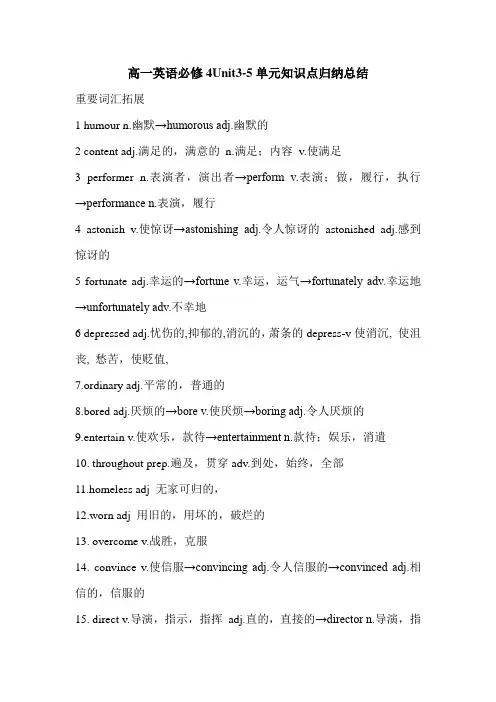
高一英语必修4Unit3-5单元知识点归纳总结重要词汇拓展1 humour n.幽默→humorous adj.幽默的2 content adj.满足的,满意的n.满足;内容v.使满足3 performer n.表演者,演出者→perform v.表演;做,履行,执行→performance n.表演,履行4 astonish v.使惊讶→astonishing adj.令人惊讶的astonished adj.感到惊讶的5 fortunate adj.幸运的→fortune v.幸运,运气→fortunately adv.幸运地→unfortunately adv.不幸地6 depressed adj.忧伤的,抑郁的,消沉的,萧条的depress-v使消沉, 使沮丧, 愁苦,使贬值,7.ordinary adj.平常的,普通的8.bored adj.厌烦的→bore v.使厌烦→boring adj.令人厌烦的9.entertain v.使欢乐,款待→entertainment n.款待;娱乐,消遣10. throughout prep.遍及,贯穿adv.到处,始终,全部11.homeless adj 无家可归的,12.worn adj 用旧的,用坏的,破烂的13. overcome v.战胜,克服14. convince v.使信服→convincing adj.令人信服的→convinced adj.相信的,信服的15. direct v.导演,指示,指挥adj.直的,直接的→director n.导演,指挥→directly adv.直地,直接地→direction n.指导,方向16.enjoyment n享乐,欢乐,乐趣17.outstanding adj.突出的,杰出的,显著的18.particular adj.特殊的,特别的→particularly adv.特殊地,特别地19 occasion n.时刻,场合→occasional adj.偶尔的,临时的→occasionally adv.偶尔地,有时地20. slide v./n.滑动,滑行21.amuse v.使发笑,使愉快→amused adj.愉快的→amusing adj.逗人发笑的,令人愉快的→amusement n.愉快,快乐22. whisper v./n.耳语,低声说23、react v.做出反应,回应→reaction n.反应,回应重点短语梳理1.break into 闯入,进入2.up to now 直到现在3.brighten the lives of 照亮某人的生活道路4.feel/be content with 对……满足5.badly off 穷的,缺少的6.in search of 寻找….7.pick out 挑选出,辨认出8.on the edge of 在…边沿9.cut off 切断,断绝10.in silence沉默,不作声11. make use of 使用12.be angry about 对…很生气13.star in 担任主角,主演重点句型再现1. He made people laugh at a time when they felt depressed, so they could feel more content with their lives.在人们感到沮丧的时候,卓别林使他们开怀大笑,于是人们对自己的生活感到比较满足。

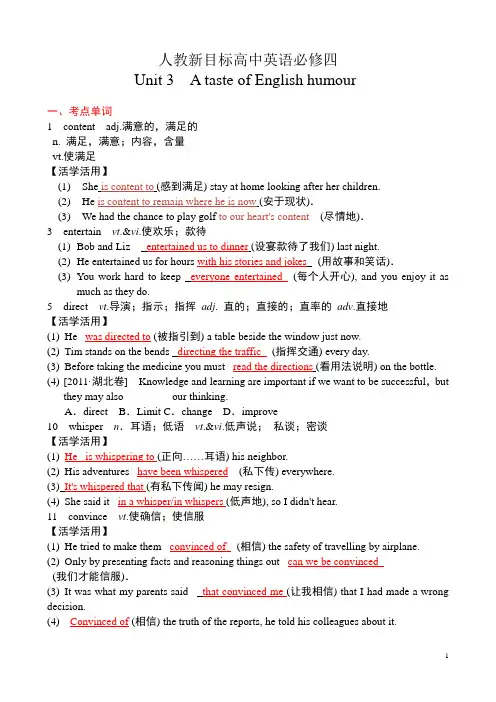
人教新目标高中英语必修四Unit 3 A taste of English humour一、考点单词1content adj.满意的,满足的n. 满足,满意;内容,含量vt.使满足【活学活用】(1) She is content to (感到满足) stay at home looking after her children.(2) He is content to remain where he is now (安于现状).(3) We had the chance to play golf to our heart's content _ (尽情地).3entertain vt.&vi.使欢乐;款待(1) Bob and Liz entertained us to dinner (设宴款待了我们) last night.(2) He entertained us for hours with his stories and jokes(用故事和笑话).(3) You work hard to keep _everyone entertained (每个人开心), and you enjoy it asmuch as they do.5direct vt.导演;指示;指挥adj. 直的;直接的;直率的adv.直接地【活学活用】(1) He _was directed to (被指引到) a table beside the window just now.(2) Tim stands on the bends _directing the traffic (指挥交通) every day.(3) Before taking the medicine you must _read the directions (看用法说明) on the bottle.(4) [2011·湖北卷] Knowledge and learning are important if we want to be successful,butthey may also ________ our thinking.A.direct B.Limit C.change D.improve10whisper n.耳语;低语vt.&vi.低声说;私谈;密谈【活学活用】(1) He _is whispering to (正向……耳语) his neighbor.(2) His adventures _have been whispered (私下传) everywhere.(3) It's whispered that (有私下传闻) he may resign.(4) She said it _in a whisper/in whispers (低声地), so I didn't hear.11convince vt.使确信;使信服【活学活用】(1) He tried to make them _convinced of (相信) the safety of travelling by airplane.(2) Only by presenting facts and reasoning things out _can we be convinced(我们才能信服).(3) It was what my parents said __that convinced me (让我相信) that I had made a wrong decision.(4) _Convinced of (相信) the truth of the reports, he told his colleagues about it.二、考点短语1badly off穷的;缺少的(比较级worse off, 最高级worst off)【活学活用】(1) Though he is always wearing old clothes, he is _not as/so badly off (并不是那么穷) as you think.(2) In fact most people are _better off (更富裕) than they were five yeas ago.3pick out(to choose or select)挑出;(distinguish)辨别出;领会(1) She __was/is picked out from thousands of applicants for the job.(2) We'll _pick up where we finished yesterday.(3) She soon _picked up French when she went to live in France.(4) Pick out those books that you'd like to read.4cut off(to shut off)切断(水、电、煤气等)供应;断绝用cut相关短语的适当形式完成句子(1) I was speaking to Ann on the phone when suddenly we were _cut off(2) The ship cut her way through the wave.(3) Cutting down costs is a good way to make profits.(4) Don't hesitate to cut out the useless information in your passage.三、考点句式1.(现在分词作结果状语常表示“意料、情理之中”,而不定式作结果状语常表出乎意料的结果)(1)She fell off the bike, breaking her left leg.(break)她从自行车上摔了下来,摔断了左腿(2)The old scientist died, leaving the project unfinished.(leave)那位老科学家去世了,留下了未完成的项目。
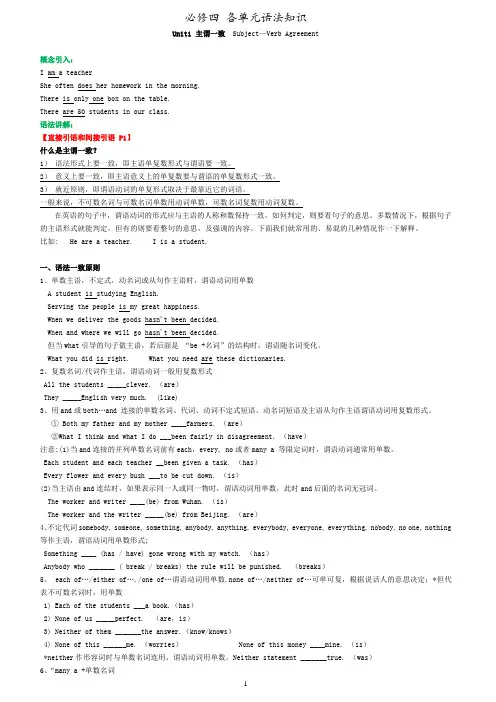
Unit1 主谓一致Subject—Verb Agreement概念引入:I am a teacherShe often does her homework in the morning.There is only one box on the table.There are 50 students in our class.语法讲解:【直接引语和间接引语 P1】什么是主谓一致?1)语法形式上要一致,即主语单复数形式与谓语要一致。
2)意义上要一致,即主语意义上的单复数要与谓语的单复数形式一致。
3)就近原则,即谓语动词的单复形式取决于最靠近它的词语。
一般来说,不可数名词与可数名词单数用动词单数,可数名词复数用动词复数。
在英语的句子中,谓语动词的形式应与主语的人称和数保持一致。
如何判定,则要看句子的意思。
多数情况下,根据句子的主语形式就能判定,但有的则要看整句的意思,及强调的内容。
下面我们就常用的、易混的几种情况作一下解释。
比如: He are a teacher. I is a student.一、语法一致原则1、单数主语,不定式,动名词或从句作主语时,谓语动词用单数A student is studying English.Serving the people is my great happiness.When we deliver the goods hasn't been decided.When and where we will go hasn't been decided.但当what引导的句子做主语,若后面是“be +名词”的结构时,谓语随名词变化。
What you did is right. What you need are these dictionaries.2、复数名词/代词作主语,谓语动词一般用复数形式All the students _____clever. (are)They _____English very much. (like)3、用and或both…and 连接的单数名词、代词、动词不定式短语、动名词短语及主语从句作主语谓语动词用复数形式。
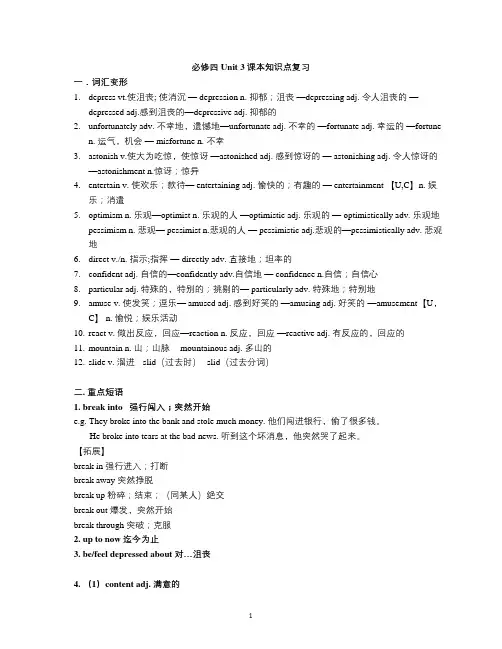
必修四Unit 3 课本知识点复习一.词汇变形1.depress vt.使沮丧; 使消沉— depression n. 抑郁;沮丧—depressing adj. 令人沮丧的—depressed adj.感到沮丧的—depressive adj. 抑郁的2.unfortunately adv. 不幸地,遗憾地—unfortunate adj. 不幸的—fortunate adj. 幸运的—fortunen. 运气,机会— misfortune n. 不幸3.astonish v.使大为吃惊,使惊讶—astonished adj. 感到惊讶的— astonishing adj. 令人惊讶的—astonishment n.惊讶;惊异4.entertain v. 使欢乐;款待— entertaining adj. 愉快的;有趣的— entertainment 【U,C】n. 娱乐;消遣5.optimism n. 乐观—optimist n. 乐观的人—optimistic adj. 乐观的— optimistically adv. 乐观地pessimism n. 悲观— pessimist n.悲观的人— pessimistic adj.悲观的—pessimistically adv. 悲观地6.direct v./n. 指示;指挥— directly adv. 直接地;坦率的7.confident adj. 自信的—confidently adv.自信地— confidence n.自信;自信心8.particular adj. 特殊的,特别的;挑剔的— particularly adv. 特殊地;特别地9.amuse v. 使发笑;逗乐— amused adj. 感到好笑的—amusing adj. 好笑的—amusement【U,C】 n. 愉悦;娱乐活动10.react v. 做出反应,回应—reaction n. 反应,回应—reactive adj. 有反应的,回应的11.mountain n. 山;山脉 -- mountainous adj. 多山的12.slide v. 溜进 --slid(过去时)--slid(过去分词)二. 重点短语1. break into 强行闯入;突然开始e.g. They broke into the bank and stole much money. 他们闯进银行,偷了很多钱。
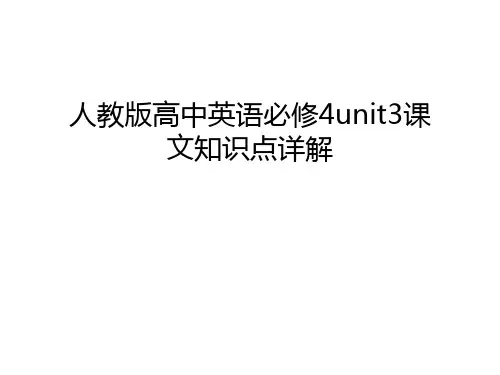

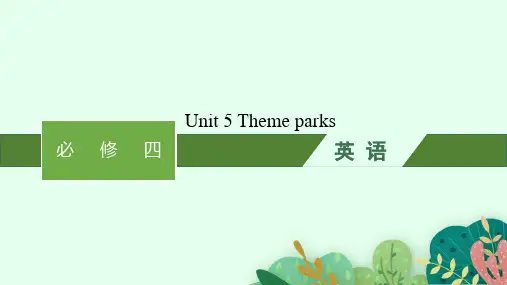
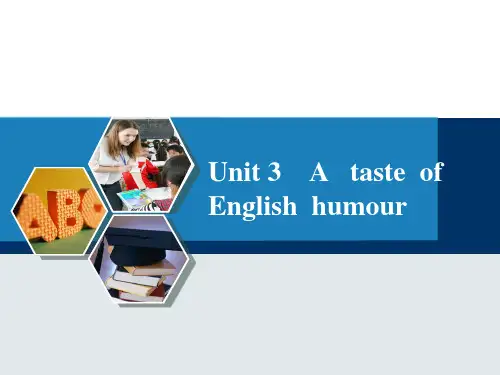
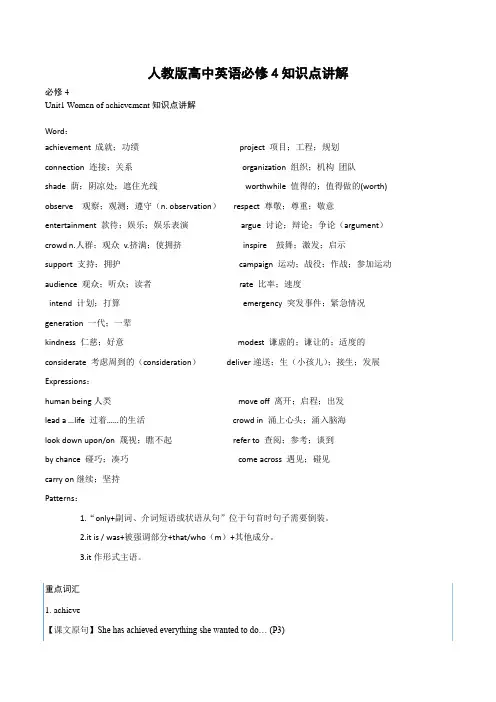
人教版高中英语必修4知识点讲解必修4Unit1 Women of achievement知识点讲解Word:achievement 成就;功绩project 项目;工程;规划connection 连接;关系organization 组织;机构团队shade 荫;阴凉处;遮住光线worthwhile 值得的;值得做的(worth) observe 观察;观测;遵守(n. observation)respect 尊敬;尊重;敬意entertainment 款待;娱乐;娱乐表演argue 讨论;辩论;争论(argument)crowd n.人群;观众v.挤满;使拥挤inspire 鼓舞;激发;启示support 支持;拥护campaign 运动;战役;作战;参加运动audience 观众;听众;读者rate 比率;速度intend 计划;打算emergency 突发事件;紧急情况generation 一代;一辈kindness 仁慈;好意modest 谦虚的;谦让的;适度的considerate 考虑周到的(consideration)deliver递送;生(小孩儿);接生;发展Expressions:human being人类move off 离开;启程;出发lead a …life 过着……的生活crowd in 涌上心头;涌入脑海look down upon/on 蔑视;瞧不起refer to 查阅;参考;谈到by chance 碰巧;凑巧come across 遇见;碰见carry on继续;坚持Patterns:1.“only+副词、介词短语或状语从句”位于句首时句子需要倒装。
2.it is / was+被强调部分+that/who(m)+其他成分。
3.it作形式主语。
必修4 Unit 2 Working the land 知识点讲解Word:statistic 统计;数据;统计数字;统计资料struggle 斗争;拼搏;努力decade 十年;十年期super 特级的;超级的output 产量;输出hunger 饥饿;欲望;(使)饥饿disturbing 引起烦恼的;令人不安的expand 使变大;伸展circulate 循环;流传battle战役;战斗;较量freedom 自由;自主therefore 因此;所以;因而equip配备;装备export 输出;出口nationality 国籍regret vt .遗憾;惋惜n.遗憾;懊悔chemical 化学的;关于化学的production 生产;制造bacteria(bacterium的复数形式)细菌nutrition 营养;滋养;食物discovery 发现;发觉underline 画底线标出;强调reduce 减少;减缩focus 焦点;中心点;集中;聚焦summary 总结;摘要;概要comment n.评论;议论vt .& vi.表达意见;作出评论Expressions:hank to幸亏,由于,因为rid…of 摆脱;除去be satisfied with 对…感到满意would rather 宁愿;宁可build up 逐渐增强;建立;开发lead to 导致;造成(后果)focus on 集中(注意力,精力等)于keep…free from /of 使…免受;使…不含Patterns:1.do you think 作插入语(what do you think would happen if …?)2. would rather…(than)…3.倍数表达法:倍数+as+adj.+as4. …make it possible to do…5.if so … if not…必修4 Unit3 A taste of humor 知识点讲解Wordhumor 幽默;滑稽comedy 喜剧content 满足的;满意的;(使)满足performer 表演者;演出者astonish 使惊诧(astonishing)fortunate 幸运的;吉利的(unfortunately不幸的)ordinary 平常的;普通的entertain使快乐;款待throughout prep.遍及;贯穿adv.到处;始终;全部homeless 无家的;无家可归的worn 永久的;用坏的;破烂的failure 失败(者)chew 咀嚼(食物);嚼碎overcome 战胜;克服convince 使信服(convincing)direct vt . & vi.导演;指标;指挥;指示gesture 姿势;手势;做手势particular adj.特殊的;特别的n.细节;细目occasion 时刻;场合budget 预知;开支slide (使)滑动;(使)滑行;滑;滑动;幻灯片mess 脏或乱的状态amuse 使发笑;使愉快(amusing)explanation解释;讲解;说明detective 侦探whisper 耳语;低语;小声说react vi.做出反应;回应Expressions:up to now 直到现在feel/be content with 对…满足badly off 穷的;缺少的pick out挑出;辨别出cut off切断;断绝star in 担任主角;主演worse off 贫困潦倒in search of 寻找as time goes by 随着时间的推移1. content【课文原句】Perhaps it makes us feel more content with our life because we feel there is someone else worse off than ourselves. (P17)【名师点拨】content adj.意为“满足的;满意的”,be content to do意为“乐意去做某事”;be content with sb / sth 意为“对某人或某事感到满意”,相当于be pleased with或be satisfied with。
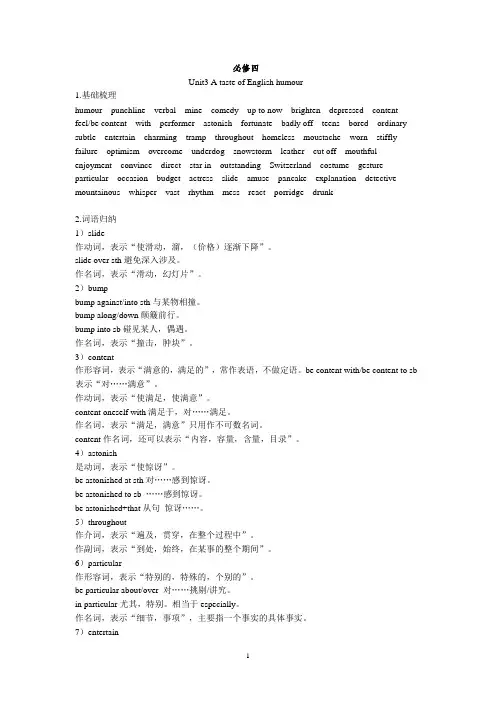
必修四Unit3 A taste of English humour1.基础梳理humour punchline verbal mine comedy up to now brighten depressed content feel/be content with performer astonish fortunate badly off teens bored ordinary subtle entertain charming tramp throughout homeless moustache worn stiffly failure optimism overcome underdog snowstorm leather cut off mouthful enjoyment convince direct star in outstanding Switzerland costume gesture particular occasion budget actress slide amuse pancake explanation detective mountainous whisper vast rhythm mess react porridge drunk2.词语归纳1)slide作动词,表示“使滑动,溜,(价格)逐渐下降”。
slide over sth避免深入涉及。
作名词,表示“滑动,幻灯片”。
2)bumpbump against/into sth与某物相撞。
bump along/down颠簸前行。
bump into sb碰见某人,偶遇。
作名词,表示“撞击,肿块”。
3)content作形容词,表示“满意的,满足的”,常作表语,不做定语。
be content with/be content to sb 表示“对……满意”。
作动词,表示“使满足,使满意”。
content oneself with满足于,对……满足。
Unit 3 A Taste of English Humour知识点复习及单元测试Part One知识要点探究一、语言要点1. specially / especially / particularly【解释】specially = on purpose故意地;专门地(不是为了别的,而只是为了某一目的而专门采用的某种方式。
如:I came here specially to see you. 我特地到这儿来看你;especially = particularly = in particular = in especial特别地;尤其是;特别是,通常用来对前面所叙述的事情作进一步说明或补充,是有意突出到显眼或例外的程度,强调“超过其他,与众不同”,在介词或连词前用得较多。
如:I like Harbin, especially in summer. 我喜爱哈尔滨,尤其是哈尔滨的夏天。
【练习】用specially,especially,particularly填空。
1). I like my hometown, _______ in spring. 2). These shoes were _______ made for you.3). A committee has been _______ appointed to look into the matter.4). We did very well in this exam, _______ our monitor.Keys: 1). especially/particularly 2). specially 3). specially4). especially2. common / usual / ordinary【解释】common意为“普通的,平常的”,指常见的,常发生的,不足为奇的;usual意为“通常的,习惯性的”,可用于一切频繁发生的事情;ordinary意为“通常的,普通的,日常的,随时都可以碰到的”,与common意思接近。
①说明被修饰名词的用途和性能。
a reading room = a room which is used for reading 阅览室
②表示所修饰的人或物的动作或状态,在意思上接近一个定语从句,可以表示正在进行的动作,也可表示经常性动作或当时的状态。
developing countries = countries that are developing发展中国家
2 作定语的动词-ing形式如是一个短语,则应放在被修饰词的后面,做后置定语,相当于一个定语从句。
They lived in a house facing south.(=which is facing south) 他们住在一所朝南的房子里。
正在访问日本的那个男人是我的叔叔。
三、动词-ing形式作宾补
1、动词-ing形式作宾语补足语常放在宾语后面,表示一个正在进行的主动性的动作,强调一个过程或一种状态。
When we returned, we found a stranger standing in front of the house.
2、当主句转换为被动结构时, 原来作宾语补足语的动词-ing形式便转换为主语补足语。
They found the film very exciting. = The film is found very exciting.
3、能用-ing形式作宾语补足语的几类动词:
1) 表示感觉和心理状态的感官动词,(常见的有see, hear, feel, smell, find, notice, observe, look at, listen to等)+ sb + doing sth(作宾补)
I felt somebody standing behind me.
2) 表示指使意义的动词使役动词,(常见的有have, set, keep, get, catch, leave等)+sb/ sth + doing sth (作宾补)
We kept the fire burning all night long.我们让火整夜燃烧着。
I won‘t have you running about in the room. 我不允许你在房间里跑来跑去。
4、see, hear, feel, watch等动词之后用-ing形式和动词不定式作宾语补足语的区别:
We heard the telephone ring. We heard the telephone ringing.。